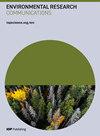Online misinformation during extreme weather emergencies: short-term information hazard or long-term influence on climate change perceptions?
IF 2.9
4区 环境科学与生态学
Q3 ENVIRONMENTAL SCIENCES
引用次数: 0
Abstract
Extreme weather events linked to climate change are becoming more frequent. The online public discourse on and during these events, especially on social media, attracts misinformation that can undermine short-term emergency responses, but can also be aimed at influencing long-term public perceptions of climate change. This contribution reviews existing research on online misinformation with the aim to understand the types, origins, and potential impacts of misinformation during extreme weather events like storms, floods, and wildfires. The screening of 289 publications reveals that there is scarce body of only 13 studies addressing this question. Relevant studies exploring online misinformation during extreme weather events rarely document misinformation immediately relevant for emergency responses and only recently link this to the discussion about climate change. The reviewed research provides however insights to derive a framework that can guide future research into this topic. Specifically, that misinformation in social media during environmental emergencies 1) cuts across domains and merges different areas of public interest, 2) cuts across temporal and geographical scales, and 3) needs to be studied as part of an interconnected online media landscape. Misinformation differs between emergency event types, can undermine the debate about climate change in diverse ways, appeal to completely different audiences and thus will likely require different responses and countermeasures. Structured research with comparable methodologies is urgently needed.极端天气紧急情况下的网络错误信息:短期信息危害还是对气候变化认知的长期影响?
与气候变化有关的极端天气事件越来越频繁。在这些事件发生时和发生期间,尤其是在社交媒体上,网上的公共讨论会吸引错误信息,这些错误信息可能会破坏短期的应急响应,但也可能旨在影响公众对气候变化的长期看法。这篇论文回顾了有关网络误导信息的现有研究,旨在了解风暴、洪水和野火等极端天气事件中误导信息的类型、起源和潜在影响。对 289 篇出版物进行筛选后发现,只有 13 项研究涉及这一问题。探讨极端天气事件期间网上误导信息的相关研究很少记录与应急响应直接相关的误导信息,只有最近才将其与气候变化讨论联系起来。不过,所回顾的研究提供了一些见解,从而得出了一个框架,可以指导今后对这一主题的研究。具体来说,环境突发事件期间社交媒体中的误导信息:1)跨越不同领域,融合了公众关注的不同领域;2)跨越时间和地理尺度;3)需要作为相互关联的网络媒体景观的一部分进行研究。不同类型的紧急事件所涉及的误导信息各不相同,会以不同的方式破坏有关气候变化的讨论,吸引完全不同的受众,因此可能需要采取不同的应对措施。迫切需要采用可比方法开展结构化研究。
本文章由计算机程序翻译,如有差异,请以英文原文为准。
求助全文
约1分钟内获得全文
求助全文

 求助内容:
求助内容: 应助结果提醒方式:
应助结果提醒方式:


